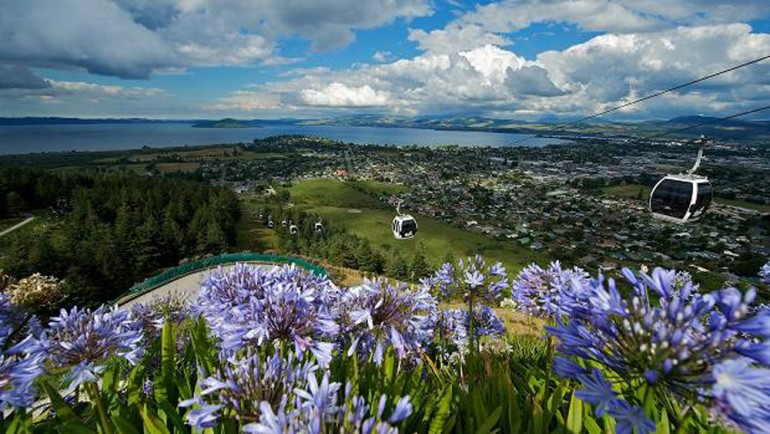Sponsored Listings:
Tess Nichol finds five things to do in Rotovegas, no matter the weather.
1 Ride the luge
We caught a gondola to the top of the hill at Skyline Rotorua, and that’s where fun began and ended for my scaredycat boyfriend.
The gorgeous views of Lake Rotorua and surrounding hills on the way up are worth the price of entry alone.
Skyline offers luging, zip-lining and a high adrenaline swing, but possibly best for those without a fear of heights and high speeds.
Nestling our bottoms into go-karts at the top of the beginner luge track, my enthusiasm was doing nothing to cajole my reluctant partner a race would be fun.
While I zipped down, zigging and zagging on each corner, he slowly made his way to the bottom at a very sensible pace, at one point being overtaken by a small child.
We enjoyed our gentle ride back up the ski lift to return our go karts, but then it started raining and it felt too mean to ask him to go down again. Off to the spa instead.
2 Have a soak in the Polynesian Spa
It probably goes without saying, but a trip to Rotorua needs to include at least one interaction with a mineral hot pool. The Polynesian Spa is the gold standard in this tourist town, and with several areas catering for varieties of customers, you can either come for a romantic dip or bring the family.
The spa’s deluxe wing, which has a separate and rather plush changing room complete with towels and toiletries provided, comprises a handful of hot pools of varying temperatures, most with a view to Lake Rotorua itself.

Plaques in the deluxe wing’s Priest Pool allude to healing properties and another promises eternal youthful beauty.
There’s certainly something restorative about unwinding in a hot mineral bath, with a lake breeze and peaceful views.
3 Go bush
are perhaps lesser known than the Polynesian Spa, but no less enchanting. Follow a winding track as it leads you further and further from State Highway 5 until you get to the valley, where six pools nestled in bush await.
It’s further from town than the Polynesian Spa, but the views are arguably better and the price is cheaper.
Spectacular views out to trees and open farmland help clear the mind and soothe the soul.
If you’re feeling really adventurous you can truly go bush and find several well-known natural hot springs in the area. Google is your friend here, or if you know a local, get them to tell you their favourite secret spot.
4 Visit Te Puia and see the Pohutu Geyser
Often people visit Te Puia three times in their life: once as a child, again when they have children and a third time when they bring their grandchildren.
The geothermal valley’s star attraction, the Pohutu Geyser, is unpredictable in its timing but incredible to witness. Starting off slow, steam begins to billow from deep underneath the rock, making the whole area look extra-terrestrial.
As the geyser gathers momentum, hot water starts to spout from the top, growing taller and taller and louder and louder. You can watch this feat of nature seated on a nearby rock, pleasantly warmed by geothermal energy.
Te Puia also houses the New Zealand Maori Arts and Crafts Institute, which takes apprentices in traditional skills like carving and weaving and trains them under masters.
Established in the 1920s, the institute fosters all aspects of Maori culture.
Day or evening tours include a tour of Te Puia’s marae and information about the area’s history, led by one of the local iwi.
If you go at night, the geyser is spectacularly lit up by lights and you can help yourself to a hangi buffet.
5 Visit Hells Gate for a unique look at geothermal activity
So named by Irish playwright, George Bernard Shaw during a visit in 1934, Hell’s Gate’s Maori name is Tikitere and it’s Rotorua’s most active geothermal area.
Featuring a mud volcano, the largest hot waterfall in the Southern Hemisphere and its own extra special set of thermal baths, Hell’s Gate is not one to miss.

Get up close — but be careful! — to boiling pits of mud and sulphurous steam on the loop track and finish the visit off with a soak in the spa. Just remember not to get the stinging mud in your eyes.
Source: nzherald.co.nz










